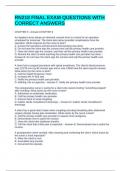-
1. Exam (elaborations) - N218 final exam review questions with correct answers
-
2. Exam (elaborations) - New nur 218 final exam content questions and answers
-
3. Exam (elaborations) - Nur 215 module 1-2 exam questions with latest update
-
4. Exam (elaborations) - Nur 217-218 exam 2 questions and answers
-
5. Exam (elaborations) - Nur 218 – communication exam 3 questions and answers
-
6. Exam (elaborations) - Nur 218 - exam 2 - week 6- skin hair and nails questions and answers
-
7. Exam (elaborations) - Nur 218 exam 1 material questions and answers
-
8. Exam (elaborations) - Nur 218 exam 1 purdue questions with correct answers
-
9. Exam (elaborations) - Nur 218 exam 1 questions and answers latest update
-
10. Exam (elaborations) - Nur 218 exam 1 questions and answers
-
11. Exam (elaborations) - Nur 218 exam 1 questions with complete solutions
-
12. Exam (elaborations) - Nur 218 exam 2 elimination questions with correct answers
-
13. Exam (elaborations) - Nur 218 exam 2 purdue questions with complete solutions
-
14. Exam (elaborations) - Nur 218 exam 2 purdue questions with latest update
-
15. Exam (elaborations) - Nur 218 exam 2 questions with complete solutions
-
16. Exam (elaborations) - Nur 218 exam 2 questions with correct answers
-
17. Exam (elaborations) - Nur 218 exam 2 study guide questions and answers
-
18. Exam (elaborations) - Nur 218 exam 3 questions with correct answers latest update
-
19. Exam (elaborations) - Nur 218 exam 3 study set questions with correct answers
-
20. Exam (elaborations) - Nur 218 exam 5- pain, fever, and inflammation questions and answers
-
21. Exam (elaborations) - Nur 218 final exam review questions with latest update
-
22. Exam (elaborations) - Nur 218 final exam study guide questions and answers
-
23. Exam (elaborations) - Nur 218 mobility exam questions and answers
-
24. Exam (elaborations) - Nur 218 nursing care during postpartum exam questions and answers
-
25. Exam (elaborations) - Nur 218 pharmacology exam 1 questions and answers latest update
-
26. Exam (elaborations) - Nur professionalism exam 1- study guide questions and answers
-
27. Exam (elaborations) - Nur-218 contemporary nursing chapters 1-4 & 6-8 exam questions with correct answers
-
28. Exam (elaborations) - Nur-218 contemporary nursing chapters 9, 10, 15-17, 19, & 20 exam questions with corr...
-
29. Exam (elaborations) - Nur-218 contemporary nursing chapters 22-28 exam questions with correct answers
-
30. Exam (elaborations) - Nur218 exam 2 questions with latest update
-
31. Exam (elaborations) - Nurn 218 exam 1 practice questions and answers
-
32. Exam (elaborations) - Nurn 218 exam 1 questions and answers
-
33. Exam (elaborations) - Nurn 218 exam 2 questions and answers latest update
-
34. Exam (elaborations) - Nurn 218 maternal newborn final exam questions and answers
-
35. Exam (elaborations) - Nurs 218 - exam #2 study guide questions and answers
-
36. Exam (elaborations) - Nurs 218 exam 1 questions with correct answers
-
37. Exam (elaborations) - Nurs 218 exam 2 questions with correct answers
-
38. Exam (elaborations) - Nurs 218 exam 3 exam questions with latest update
-
39. Exam (elaborations) - Nurs 218 pharmacology study guide --exam 1 questions with latest update
-
40. Exam (elaborations) - Nursing 218 final exam study guide questions and answers
-
41. Exam (elaborations) - Nursing 218 test #1 exam questions and answers
-
42. Exam (elaborations) - Nursing informatics exam questions and answers
-
43. Exam (elaborations) - Purdue nur 218 exam 3 questions with correct answers
-
44. Exam (elaborations) - Purdue nurs 218 exam 2 questions with verified answers
-
45. Exam (elaborations) - Rn218 1 exam questions with verified answers
-
46. Exam (elaborations) - Rn218 final exam questions with correct answers
-
Show more




